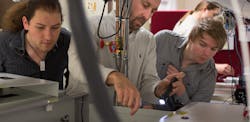SPIE and University of Glasgow announce $1 million quantum photonics program
On 28 July, SPIE, the international society for optics and photonics (Bellingham, WA), and the University of Glasgow (Scotland) announced the establishment of the SPIE Early Career Researcher Accelerator Fund in Quantum Photonics. The $500,000 gift from the SPIE Endowment Matching Program will be matched 100% by the University. The program will support a diverse group of graduate students working in the field of quantum photonics and will be managed by Professor Daniele Faccio, Royal Academy of Engineering Chair in Emerging Technologies, and Kelvin Chair of Natural Philosophy Professor Miles Padgett.
The fund will create two new programs at the University. An annual SPIE Early Career Researcher in Quantum Photonics Scholarship will be awarded to an outstanding University of Glasgow graduate student who is in the process of completing their studies; in addition, the SPIE Global Early Career Research program will support outgoing and incoming placements at and from the University as part of its ongoing collaboration with leading quantum-photonics research groups across the globe. Each year, the program will pair several University early-career researchers with counterparts from outside laboratories for six-month-long shared projects.
“The University’s quantum-photonics expertise is world-leading, and our researchers have found ways to see through walls, capture images at a trillion frames per second, and take the very first pictures of quantum entanglement in action,” says Professor Sir Anton Muscatelli, principal and vice-chancellor of the University of Glasgow. “This additional funding will help the University train a new generation of graduate students to make valuable contributions to academia and industry and inspire them to make their own amazing research breakthroughs.”
The SPIE Endowment Matching Program, established in 2019, is a $2.5 million, five-year, educational-funding initiative designed to increase international capacity in the teaching and research of optics and photonics. SPIE supports optics and photonics education and the future of the industry by contributing a match of up to $500,000 per award to college and university programs with optics and photonics degrees, or with other disciplines allied to the SPIE mission. The initial SPIE contribution to the University of Arizona named a new endowed faculty chair, the SPIE Chair in Optical Sciences. Four more agreements announced earlier this year established the SPIE-Glebov Family Optics and Photonics Graduate Scholarship Fund and the Soileau Family-SPIE Optics and Photonics Undergraduate Scholarship Fund, both at the University of Central Florida’s (UCF) College of Optics and Photonics (CREOL), the Baur-SPIE Endowed Chair in Optics and Photonics at JILA, and the SPIE@ICFO Chair for Diversity in Photonic Sciences.
Source: https://spie.org/news/spie-and-university-of-glasgow-announce-one-million-dollar-quantum-photonics-program-
About the Author
John Wallace
Senior Technical Editor (1998-2022)
John Wallace was with Laser Focus World for nearly 25 years, retiring in late June 2022. He obtained a bachelor's degree in mechanical engineering and physics at Rutgers University and a master's in optical engineering at the University of Rochester. Before becoming an editor, John worked as an engineer at RCA, Exxon, Eastman Kodak, and GCA Corporation.

